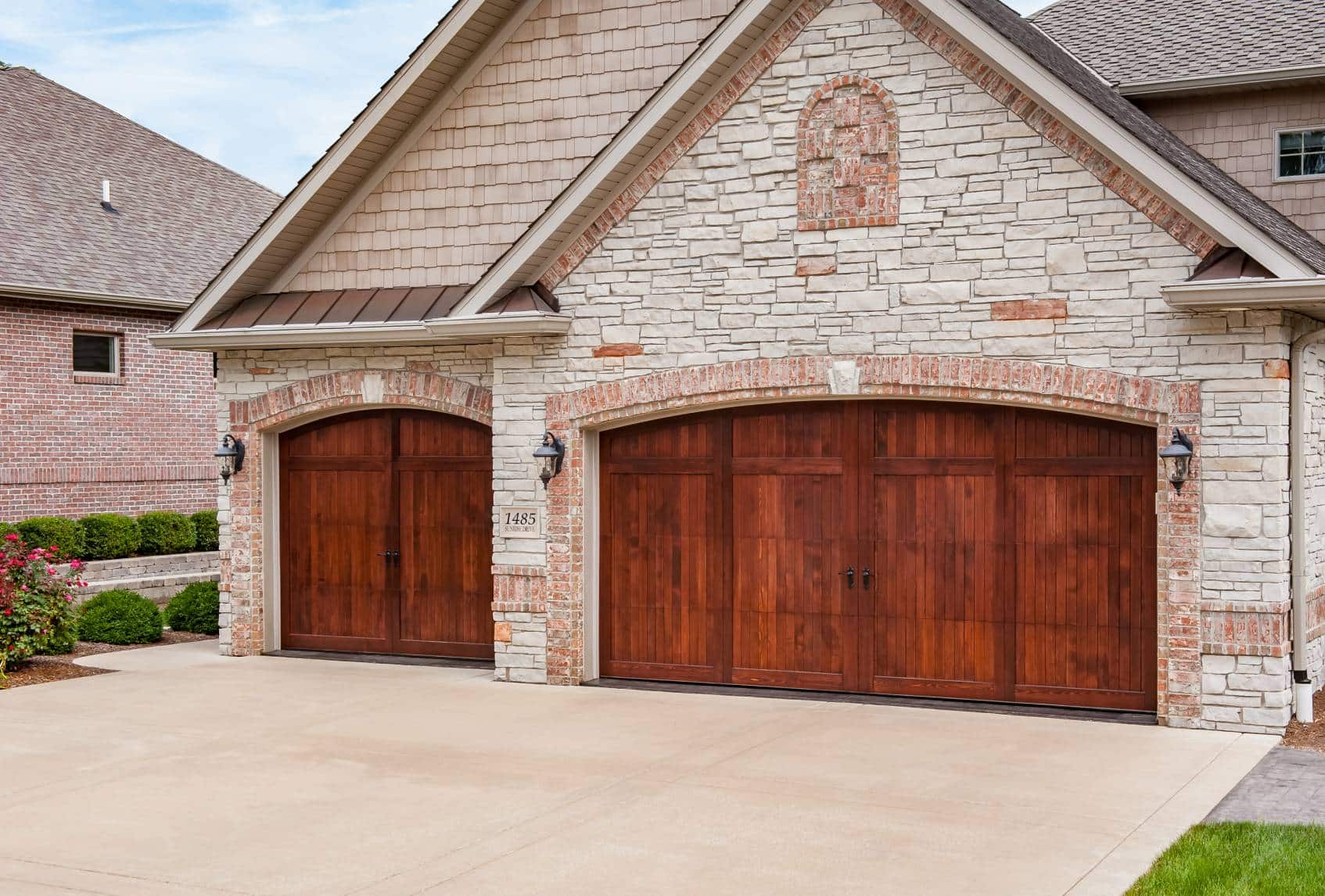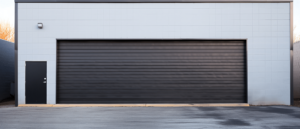Topics Covered:
As part of the RJ Garage Door Services team, we frequently advise homeowners on upgrades that not only enhance curb appeal but also boost market worth, and garage door materials play a pivotal role in that equation. Whether you’re considering steel garage doors for their durability, wood garage doors for timeless elegance, or aluminum garage doors for modern lightness, the choice can significantly affect buyer perceptions and ROI. In this guide, we’ll examine common materials like fiberglass garage doors, vinyl garage doors, and composites, highlighting how they contribute to energy efficiency, maintenance needs, and overall home value. With real estate trends this year showing that curb appeal can add 5-11% to a property’s price, selecting the right garage door material isn’t just about aesthetics—it’s a smart investment. We’ll dive into pros, cons, cost comparisons, and data-driven insights to help you decide what fits your resale goals. From insulated garage doors that improve energy savings to custom designs that wow potential buyers, understanding these impacts can maximize your return when it’s time to sell. Let’s uncover how these materials can elevate your home’s appeal and financial payoff.
Overview of Garage Door Materials and Their Role in Resale Value
Garage door materials are more than functional choices—they directly shape a home’s first impression and resale potential. We often explain to clients that the garage door occupies up to 30-40% of a home’s facade, making its material a key factor in curb appeal, which can increase property value by 7% on average according to real estate studies. Common options include steel for affordability and strength, wood for classic warmth, aluminum for lightweight modernity, fiberglass for weather resistance, vinyl for low upkeep, and composites that blend benefits. Each material affects resale through factors like durability, energy efficiency, maintenance, and aesthetic versatility. For instance, insulated materials like steel or fiberglass can lower utility bills, appealing to eco-conscious buyers and potentially adding to ROI.
When we assess resale value, it’s clear that material choice ties into broader home improvement trends. Reports indicate that garage door replacements offer an ROI of 96-102%, but this varies by material. Steel doors, being cost-effective and durable, often yield higher net returns due to lower initial costs and minimal maintenance, while wood doors might command premium prices in upscale markets but deduct value if upkeep is neglected. Aluminum and vinyl shine in coastal or humid areas for rust resistance, preserving long-term appeal. Fiberglass mimics wood without the rot risk, making it a smart pick for value retention in varied climates. Composites provide a balance, offering wood-like looks with synthetic durability.
Diving deeper, energy efficiency plays a big part. Insulated materials reduce heat loss, which buyers prioritize, especially with rising energy costs. We recommend considering local market preferences—steel dominates in suburban areas for its versatility, while wood appeals in historic neighborhoods. Maintenance impacts value too; high-maintenance materials like wood can deter buyers if not pristine, potentially lowering offers by 5-10%. Conversely, low-maintenance vinyl or fiberglass can justify higher asking prices. In our experience servicing diverse homes, materials that align with regional styles—such as aluminum in modern builds—enhance perceived value, leading to faster sales.
To quantify, industry data shows homes with updated garage doors sell for 4-7% more, with material influencing that premium. For example, a $3,800 investment in a steel door might recoup $3,900 at sale. We advise factoring in installation costs and warranties, as lifetime guarantees on steel or fiberglass add buyer confidence.
Common Garage Door Materials List
- Steel: Affordable, durable, insulated options available.
- Wood: Elegant, customizable, but high maintenance.
- Aluminum: Lightweight, rust-resistant, modern aesthetic.
- Fiberglass: Weatherproof, low upkeep, mimics wood.
- Vinyl: Dent-resistant, minimal care, good for families.
- Composite: Blend of wood and synthetics for balance.
| Material | Average Cost Range | Estimated ROI | Key Resale Benefit |
|---|---|---|---|
| Steel | $800-$2,000 | 96-102% | High durability, low cost |
| Wood | $1,200-$4,000 | 85-95% | Premium appeal in luxury markets |
| Aluminum | $1,500-$2,500 | 90-98% | Rust resistance for coastal homes |
| Fiberglass | $1,500-$2,500 | 92-100% | Low maintenance, versatile looks |
| Vinyl | $1,000-$2,500 | 95-101% | Family-friendly resilience |
| Composite | $1,200-$3,000 | 90-99% | Aesthetic without wood drawbacks |
This overview highlights how materials drive resale dynamics, setting the stage for deeper analysis.
Steel Garage Doors: Durability Meets Affordability for Optimal Resale
Steel garage doors stand out as a top choice for boosting resale value due to their blend of affordability, strength, and low maintenance. We frequently install steel doors for clients aiming to maximize ROI, as they offer returns of 96-102% according to remodeling reports. Their galvanized construction resists rust, dents, and weathering, making them ideal for high-traffic homes where buyers seek longevity without ongoing costs. Insulated steel doors, in particular, enhance energy efficiency by reducing heat transfer, which can appeal to buyers in variable climates and add 5-7% to home value through lower utility bills. The material’s versatility allows for various styles, from contemporary panels to carriage-house designs, fitting diverse architectural tastes and elevating curb appeal.
Expanding on benefits, steel’s cost-effectiveness is key—ranging from $800 to $2,000, it’s accessible for most budgets yet delivers premium durability. We see this in markets where steel doors help homes sell faster, as buyers appreciate the minimal upkeep; a simple wash keeps them looking new. Compared to wood, steel avoids warping or rotting, preserving value over time. However, non-insulated versions might detract in cold regions, where energy loss could lower perceived efficiency. In our projects, adding insulation boosts resale by emphasizing sustainability, a growing buyer priority.
Potential drawbacks include dent susceptibility in basic models, which could affect aesthetics if not addressed, potentially reducing offers by 2-3%. Upgrading to thicker gauges mitigates this, ensuring the door maintains its value-enhancing role. Overall, steel’s balance makes it a resale winner, often recouping nearly full investment.
Pros of Steel Garage Doors for Resale
- High Durability: Resists weather and wear for long-term appeal.
- Low Cost: Affordable entry point with strong ROI.
- Energy Options: Insulated models cut bills, attracting buyers.
- Style Variety: Matches any home design.
- Easy Maintenance: Minimal effort preserves value.
Cons of Steel Garage Doors for Resale
- Dent Risk: Impacts aesthetics if not premium grade.
- Weight: Heavier, requiring robust openers.
- Limited Natural Look: Less warm than wood for some markets.
| Steel Type | Cost | ROI Estimate | Resale Impact |
|---|---|---|---|
| Basic Non-Insulated | $800-$1,200 | 96% | Good for budget flips |
| Insulated Standard | $1,200-$1,500 | 98% | Energy savings boost |
| Premium Thick Gauge | $1,500-$2,000 | 102% | Luxury appeal, dent-resistant |
Steel remains a smart pick for resale-focused upgrades.
Wood and Composite Garage Doors: Timeless Appeal with Considerations
Wood garage doors bring classic elegance that can significantly elevate resale value, often adding a premium feel in upscale or historic neighborhoods. We recommend them for clients wanting to differentiate their property, as wood’s natural warmth and customizability can increase curb appeal, potentially raising home prices by 5-10%. Materials like cedar or redwood offer rich grains and colors, mimicking high-end architecture, with ROI around 85-95% due to their aesthetic pull. Composites, blending wood fibers with resins, provide similar looks at lower costs ($1,200-$3,000) and better durability, yielding 90-99% returns by reducing maintenance woes.
The charm of wood lies in its authenticity—buyers in luxury markets associate it with quality, making homes stand out. We install wood doors that integrate insulation for energy efficiency, appealing to eco-buyers and preserving value. However, high maintenance is a hurdle; regular sealing against moisture can cost $200-400 yearly, and neglect might lower resale by 5% from visible wear. Composites address this, offering rot-resistance and low upkeep, making them a resale-friendly alternative for busy sellers.
Drawbacks include higher upfront costs and susceptibility to elements, which could deter budget-conscious buyers. In our experience, well-maintained wood doors sell homes faster, but composites offer broader appeal.
Pros of Wood/Composite for Resale
- Aesthetic Premium: Boosts luxury perception.
- Customization: Tailored designs for unique value.
- Insulation Potential: Energy-efficient options.
- Eco-Appeal in Composites: Sustainable materials.
- Durability in Composites: Less maintenance than pure wood.
Cons of Wood/Composite for Resale
- High Maintenance for Wood: Ongoing costs deduct value.
- Pricey: Limits budget buyers.
- Weather Vulnerability: Rot or warp if not cared for.
- Fewer Options in Composites: Less authentic feel.
| Material | Cost Range | ROI | Resale Note |
|---|---|---|---|
| Solid Wood | $1,200-$4,000 | 85-95% | High in historic areas |
| Composite Wood | $1,200-$3,000 | 90-99% | Balance of look and ease |
Wood and composites add character for targeted resale.
Aluminum, Fiberglass, and Vinyl: Modern Low-Maintenance Choices
Aluminum garage doors offer a sleek, contemporary look that can enhance resale in modern or coastal homes, with ROI of 90-98% thanks to rust resistance and lightness. Costing $1,500-$2,500, they’re easy to operate and insulate, appealing to buyers seeking low-effort efficiency. Fiberglass, at similar prices, mimics wood without rot, providing 92-100% returns through weatherproofing and minimal upkeep. Vinyl, ranging $1,000-$2,500, excels in durability against dents and rust, yielding 95-101% ROI for family-oriented markets.
These materials shine in harsh climates—aluminum for salt air, fiberglass for humidity, vinyl for impacts. We install them for clients prioritizing maintenance-free living, as they retain value without annual treatments. However, aluminum dents easily, fiberglass may fade, and vinyl lacks premium feel.
Pros of Aluminum/Fiberglass/Vinyl for Resale
- Rust Resistance: Ideal for coasts, preserving value.
- Low Maintenance: Attracts busy buyers.
- Lightweight: Easier on openers.
- Affordable Modern Look: Broad appeal.
- Insulation Options: Energy savings.
Cons of Aluminum/Fiberglass/Vinyl for Resale
- Dent/Fade Risks: Aesthetic wear over time.
- Less Customizable: Limited styles.
- Perceived Quality: Not as luxurious as wood/steel.
| Material | Cost | ROI | Resale Benefit |
|---|---|---|---|
| Aluminum | $1,500-$2,500 | 90-98% | Coastal durability |
| Fiberglass | $1,500-$2,500 | 92-100% | Wood-like without rot |
| Vinyl | $1,000-$2,500 | 95-101% | Family resilience |
These options provide practical value boosts.
Factors to Consider When Choosing Materials for Maximum Resale
Beyond material, several factors influence how garage doors affect resale. We guide clients on local market trends—steel dominates suburbs for 96% ROI, while wood suits luxury at 85-95%. Insulation is crucial; it improves energy efficiency, adding 5% value in cold areas. Style alignment with home architecture enhances curb appeal, potentially speeding sales by 20%. Budget vs. quality matters—mid-range materials like composites offer 90% ROI without high upkeep.
Maintenance history impacts offers; documented care reassures buyers. We suggest professional installations for warranties, boosting confidence. Regional climate dictates choices—vinyl for humid zones, aluminum for coasts. Smart features like openers can amplify material benefits, increasing overall value by 10%.
Factors Influencing Resale List
- Market Trends: Match local preferences.
- Insulation: Energy savings appeal.
- Style Fit: Architectural harmony.
- Maintenance Records: Proof of care.
- Climate Suitability: Material resilience.
| Factor | Impact on Value | Example |
|---|---|---|
| Insulation | +5-7% | Steel with foam |
| Style | Faster sales | Modern aluminum |
| Maintenance | +2-5% | Low-upkeep vinyl |
| Climate | Value retention | Fiberglass in humid |
| Smart Add-Ons | +10% | Wi-Fi openers |
Consider these for optimal resale.
Conclusion
Wrapping up, we at RJ Garage Door Services believe garage door materials profoundly impact home resale value through curb appeal, durability, and efficiency. From steel’s high ROI to wood’s premium charm, choosing wisely can yield 85-102% returns. Our team can help assess your home, recommend materials, and install for maximum value.
If you need help with garage doors, contact the RJ Garage Door Services team today for expert assistance tailored to your needs.




